Galvalume Roofing
Over time, most homes and business facilities will need a new roof. Besides age, factors such as harsh weather conditions, severe storms and fire can lead to roof deterioration and damage. Having a roof installed can be costly; therefore, how can consumers choose a roof that is durable and long lasting, so replacement costs can be kept at a minimum? Galvalume roofing may be the answer and the costs could surprise you.
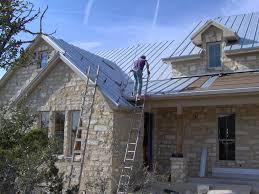
What is Galvalume Roofing Material?
One roofing material that stands above the rest for high quality, longevity and durability is galvalume. This superior roofing material, also used as siding, is actually sheets of steel, coated with a composition of 45% zinc and 55% aluminum. This coating acts as an excellent protection against corrosion. A tiny amount of silicon has also been added to the material to give it more durability when it is stored, rolled or bent during the manufacturing process.
Galvalume sheet steel is becoming increasingly popular as roofing material choice because of its versatility and aesthetical appearance. It comes in a vast array of colors and design options for a contemporary or traditional look. The surface of galvalume can be left bare since it retains a bright shine but can also be successfully painted. It can be shaped and applied to various applications including architectural, institutional and industrial structures such as universities, administrative buildings and warehouses.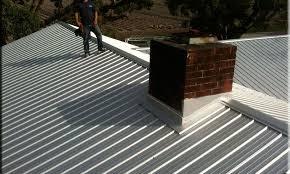
Galvalume is also available to mimic other roofing material including slate, cedar shake, shingles, asphalt and even clay tile, but lasts much longer. Consumers won't be cramped for style with a roof made from galvalume steel. If a certain color is desired, the manufacturer will use a high-quality, baked-on enamel that is warranted to last for up to 40 years. This means that the company will guarantee that the paint won't chip, peel or crack during that time.
Major Costs of Galvalume Roofing
What a consumer will pay for a galvalume roofing system depends on the quality of the material. Galvalume steel comes in various gauges that determine the quality and price. For example, a galvalume section that is 16'X3', known as a Classic Rib Steel Roof Panel, is 29-gauge steel and comes with a 25 year warranty. The cost for this grade is estimated at $70 per square, which is the same as 100 square feet in layman's terms. There are also higher grades of galvalume roofing at cost between $200 and $700 per square, which may be thicker, have a longer warranty or have other features such as a decorative stone coating.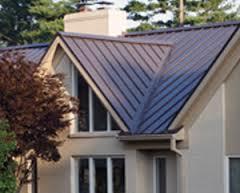
Many variables are involved with installing galvalume roofing. Consumers should expect to pay about $50 to $70 per hour for a professional roofer to do the job. However, some roofers charge an average of $300 per square, which includes the price of the material.
The time of the entire installation also depends on factors such as how experienced the roofer and his crew are, the roof's pitch and the condition of the roof. If previous roofing material must be torn off, it will add to the cost of labor. No contractor can be absolutely sure what condition the structure is in until the old material is removed. If there is severe damage, repair costs should be calculated into the entire job plus costs to dispose of the old material.
Basically, a galvalume metal roof takes about three times longer than the labor involved in installing a conventional asphalt shingled roof. Specially trained installers must measure accurately and precisely so expensive material isn't wasted and the manufacturer's warranty won't be voided.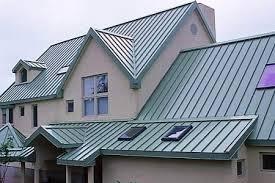
Materials Needed for the Installation Process
Below is a list of materials a roofer will purchase in order to install a galvalume metal roof. The costs are minimal and are usually included in the roofer's final estimate. The cost for synthetic underlayment may be extra and is estimated at $20 to $30 per square. Some optional items consumers may consider replacing during the roofing installation job are gutters and drains that cost an average of $7 per linear foot.
In the end, an average residential structure with a roofing surface of about 2,200 square feet will cost about $17,000 for a mid-priced galvalume steel roof installation, which includes all of the material.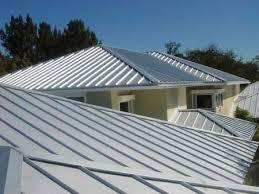
Advantages of Galvalume Steel Roofs
Galvalume steel roofing material has so many advantages to consider with the first one being longevity of life. Because of the coating, this material is resistant to atmospheric corrosion and can last from 50 to 75 years, outlasting comparable galvanized roofing material. Other advantages are:
Expands with heating and cooling
Withstands well in hot and humid climates
A good radiant barrier
100-percent recyclable
Backed by a 40- to 50-year warranty
Won't crack and peel
Withstands storms well
Lightweight
Can be installed over existing roofing
Good thermal reflectivity properties assists with energy savings year-round
Weather-tight
Maintenance-free
Leakproof
Noncombustible Class "A" rating
Disadvantages of Galvalume Steel Roofs
The main disadvantage of galvalume steel roofing material is the initial cost of the product, which is double the cost of a shingled roof. It also takes longer and requires special training to be installed as it can easily dent. This material will rapidly corrode if it comes in contact with concrete and mortar. If consumers use this galvalume around confined animals or agriculture, the warranty is voided as it will tend to corrode in this environment.
Galvalume Finish Corrugated Metal Roofing
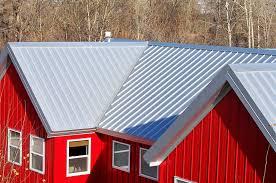
Galvalume Panels Galvalume finish corrugated metal is one of the most corrosion resistant corrugated materials offered in the architectural roofing and siding panel market. Unlike normal galvanizing, this metal material is an actual combination of aluminum and zinc to provide excellent protection. Galvalume-finished corrugated metal will give you a great product that lasts longer than the traditional galvanized finish. The corrosion resistance of this corrugated metal will make this the ideal product for almost any application, by marrying the lightweight aspect and advantage of aluminum, with less chance of the material corroding at the normal stress points, and areas where rusting can start. GALVALUME Steel Sheet is carbon steel sheet coated with aluminum-zinc alloy by a continuous hot-dip process described in Production Methods. The nominal coating composition is 55% aluminum and 45% zinc. A small but important amount of silicon is included in the coating alloy. It is added not to enhance the corrosion performance, but to provide good coating adhesion to the steel substrate when the product is roll-formed, drawn, or bent during fabrication. GALVALUME® steel sheets combine the excellent barrier corrosion protection of aluminum with the galvanic protection of zinc. The result is a coating that lasts a long time, a coating that provides cut-edge protection along sheared edges, and therefore, a coating that offers excellent protection to steel sheets. Although there are a few exceptions, for most applications in most types of environments GALVALUME steel sheet is the preferred product for long-term resistance to atmospheric corrosion. It outlasts a galvanized coating of comparable thickness, and offers cut-edge protection that is not available with aluminum-coated sheet. This cut-edge protection means there is less rust-staining along sheared edges, at scratches, and other imperfections in the coating. Also, since the coating is so resistant to corrosion, it retains a very bright surface appearance when exposed to most conditions. These attributes make GALVALUME steel sheet the preferred material for roofing. The superior corrosion resistance of GALVALUME steel sheet is achieved by the presence of microscopic zinc-rich and aluminum-rich areas within the coating. The aluminum-rich areas, which corrode very slowly, provide the long-term durability while the zinc-rich areas, which corrode preferentially, provide galvanic protection. In most cases we offer only certain styles and profiles in the galvalume material but are adding new products daily. Please feel free to call and request your next application in galvalume and we can always quote your particular job using the material. Galvalume is one of the best materials that one can use for the extreme outdoor applications that are required today, and since it is cheaper then stainless, and more corrosion resilient then galvanized – Galvalume is the choice!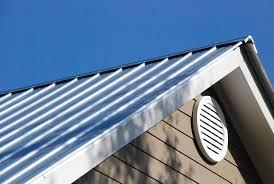
The expected lifespan of a metal roof is 30 to 45 years in Florida. The most common metal roof material we see in this area is galvalume, which is a steel sheet with an electrolytically-applied coating of a combination of zinc and aluminum to extend the lifespan. It is manufactured in many different profiles, including corrugated, standing seam, 5V-crimp, and PBR, to name just a few; and can have a clear or painted finish. Galvanized steel metal roofing, which is an older type no longer used for residential roof, has a shorter lifespan.
The average lifespan estimate is based standard metal, which is 26-gauge, and "average" conditions. Many factors contribute to a longer or shorter life of the roof; so a particular metal roof's life can vary—sometimes significantly—from the average. Here's a list of conditions that affect roof longevity:
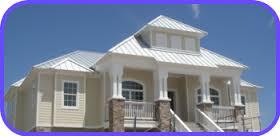
•Thickness of metal - 24-gauge metal, which is thicker, will have a longer lifespan. Lighter gauge metal, such as 28 and 30-gauge, are typically only used to agricultural barn roofs and have a shorter expected life.
•Color of roof - A dark color painted roof absorbs more heat, and the paint will oxidize sooner.
•Angle of roof slope - Higher pitch roofs tend to last longer.
•Proximity to Ocean - Salt air mist accelerates the corrosion of metal roofing and manufacturers' warranties have exclusions for installations near salt water.
•Orientation of roof surface - A roof slope facing south will get more sunlight, and have a shorter life.
•Quality of roof material - "Economy" roof materials have a shorter life.
•Installation - Sloppy or improper installation shortens roof life. Manufacturers typically blame the roofing contractor for a roof that has a short life, and they are sometimes correct. Exposed fasteners, over-driven fasteners, and poor or missing flashing at valleys and edges will shorten the roof life.
•Attic ventilation - An unventilated or poorly ventilated attic reduces roof lifespan.
•Trees near roof - Tree branches rubbing on a roof or the acidity from the accumulation of leaf debris on a roof shortens its life.
•Harsh climate - Severe weather, both harsh winters and hot summers, along with big temperature swings within a 24-hour period, also shorten lifespan because of the expansion and contraction of roof materials.

Metal roofs begin to corrode as they age and, when spots begin to pit and rust through as in the photo below of an extremely old galvanized steel corrugated roof in Cedar Key, the roof is at the end of its lifespan.
To find out the difference in cost for a metal roof, visit our blog: "What is the cost difference between asphalt shingle and metal roofing?"
To learn more about how to recognize when it's time to replace your roof, go to our blog: "How can I tell if the house needs a new roof?"
If you want to understand the difference between an "architectural" and a regular shingle roof, see our blog: "What's the difference between an "architectural" and a regular shingle roof?"
To figure out why your roof is leaking, go to our blog: "Why is my roof leaking?"
A Study Demonstrates GALVALUME Provides Sustainable Value for the Life of a Building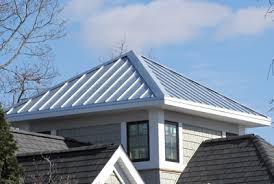
Buildings account for 40 percent of our nation's energy consumption and almost 75 percent of the electricity used in the country. According to the Washington, D.C.-based Nuclear Energy Institute, energy consumption is expected to grow 1.1 percent annually. By 2030 our nation's electricity demands will be 45 percent greater than today. Many people neglect to recognize the cheapest and most reliable source of energy is the energy we don't use. Saving energy through energy efficiencies and sustainability is important to our nation's future. Fortunately, retrofitting with metal roofing can help buildings conserve energy. GALVALUME-coated steel, a 55 percent aluminum-zinc alloy coated steel product, is a significant part of the larger family of metal roofing products.
The U.S. Department of Energy, Washington, estimates that in an average building, about one-third of the energy used is for cooling and heating of some sort. Of that cooling/heating energy, about one-half is attributed to the solar heat gain and heat loss at the roof. Yet, with today's building stock, the roof is often the least energy-efficient component of the building.
Cool metal roofing can help. A cool metal roof has a high solar reflectance that keeps the surface relatively cooler than conventional roofing. GALVALUME roofing has a high solar reflectance when used unpainted. With cool pigmented paint systems applied to GALVALUME roofing, the solar reflectance and thermal emittance can be high, which is the ideal cool roof in climates where cooling dominates.
GALVALUME-coated Steel
According to the Washington-based U.S. Environmental Protection Agency, "Sustainability is important to making sure that we have and will continue to have, the water, materials, and resources to protect human health and our environment." The use of GALVALUME sheet as a metal roofing product provides sustainability in a number of categories.
The strength, durability and longevity of the product help to minimize the replacement schedule, which lowers the environmental impact of replacing the product with virgin material. The GALVALUME sheet steel product has as a minimum 25 percent recycled content and at the end of its useful service life, it is fully recyclable. These features help to keep metal roofing, like GALVALUME sheet, out of landfills.
Retrofitting with GALVALUME roofing creates opportunities for improving the energy efficiency of the roof system. By adding more insulation or a radiant barrier or solar-thermal heating systems or even photovoltaics, a GALVALUME retrofit roof often helps lower the environmental burden of the building and reduce cooling and heating energy. According to the results of a metal roofing industry study, these benefits are predicted to last for the life of the building itself because of the excellent projected service life of the GALVALUME-coated steel product.
Long-term Durability
The 10 roof locations, indicating the average pH of the precipitation across the U.S.
Figure 1: The 10 roof locations, indicating the average pH of the precipitation across the U.S.
In a study sponsored by the Zinc-Aluminum Coaters Association and the Glenview, Ill-based Metal Construction Association, a novel inspection and durability analysis protocol, published in the Journal of ASTM International in September 2011, was used to evaluate 10 unpainted GALVALUME low-slope standing-seam roof (SSR) systems ranging in age from 20 to 35 years and located in four U.S. climate zones. Although the full report predicting the service life of the total roof system is still in preparation, the results for the GALVALUME SSR panels themselves on these 10 roofs are reported within this article. The results provide clear evidence of the superior long-term durability of GALVALUME SSR panels. As such, they produce a significant beneficial impact on the calculations used for green-building rating systems and life-cycle analyses for newly built and retrofit roofing applications.
Although the sample locations are shown as circular disks, the actual samples were much larger in size and rectangular in shape. After sampling, the end lap was subsequently reassembled with new butyl polymer tape sealants and supplemented with tube-grade butyl polymer as necessary to ensure a complete, weathertight seal on a new GALVALUME section.
- Areas We Serve
- Cities We Serve
Areas We Serve
75002 (Allen)
75006 (Carrollton)
75007 (Carrollton)
75009 (Celina)
75010 (Carrollton)
75013 (Allen)
75019 (Coppell)
75022 (Flower Mound)
75023 (Plano)
75024 (Plano)
75025 (Plano)
75028 (Flower Mound)
75032 (Rockwall)
75034 (Frisco)
75035 (Frisco)
75038 (Irving)
75039 (Irving)
75040 (Garland)
75041 (Garland)
75042 (Garland)
75043 (Garland)
75044 (Garland)
75048 (Sachse)
75050 (Grand Prairie)
75051 (Grand Prairie)
75052 (Grand Prairie)
75054 (Grand Prairie)
75056 (The Colony)
75057 (Lewisville)
75060 (Irving)
75061 (Irving)
75062 (Irving)
75063 (Irving)
75065 (Lake Dallas)
75067 (Lewisville)
75068 (Little Elm)
75069 (McKinney)
75070 (McKinney)
75071 (McKinney)
75074 (Plano)
75075 (Plano)
75077 (Lewisville)
75078 (Prosper)
75080 (Richardson)
75081 (Richardson)
75082 (Richardson)
75087 (Rockwall)
75088 (Rowlett)
75089 (Rowlett)
75093 (Plano)
75094 (Plano)
75098 (Wylie)
75101 (Bardwell)
75104 (Cedar Hill)
75114 (Crandall)
75115 (Desoto)
75116 (Duncanville)
75119 (Ennis)
75125 (Ferris)
75126 (Forney)
75132 (Fate)
75134 (Lancaster)
75135 (Caddo Mills)
75137 (Duncanville)
75141 (Hutchins)
75142 (Kaufman)
75146 (Lancaster)
75147 (Mabank)
75149 (Mesquite)
75150 (Mesquite)
75152 (Palmer)
75154 (Red Oak)
75157 (Rosser)
75158 (Scurry)
75159 (Seagoville)
75160 (Terrell)
75161 (Terrell)
75164 (Josephine)
75165 (Waxahachie)
75166 (Lavon)
75167 (Waxahachie)
75172 (Wilmer)
75173 (Nevada)
75180 (Mesquite)
75181 (Mesquite)
75182 (Sunnyvale)
75189 (Royse City)
75201 (Dallas)
75202 (Dallas)
75204 (Dallas)
75205 (Dallas)
75206 (Dallas)
75207 (Dallas)
75208 (Dallas)
75209 (Dallas)
75210 (Dallas)
75211 (Dallas)
75212 (Dallas)
75214 (Dallas)
75215 (Dallas)
75216 (Dallas)
75217 (Dallas)
75218 (Dallas)
75219 (Dallas)
75220 (Dallas)
75223 (Dallas)
75224 (Dallas)
75225 (Dallas)
75226 (Dallas)
75227 (Dallas)
75228 (Dallas)
75229 (Dallas)
75230 (Dallas)
75231 (Dallas)
75232 (Dallas)
75233 (Dallas)
75234 (Dallas)
75235 (Dallas)
75236 (Dallas)
75237 (Dallas)
75238 (Dallas)
75240 (Dallas)
75241 (Dallas)
75243 (Dallas)
75244 (Dallas)
75246 (Dallas)
75247 (Dallas)
75248 (Dallas)
75249 (Dallas)
75251 (Dallas)
75252 (Dallas)
75253 (Dallas)
75254 (Dallas)
75270 (Dallas)
75287 (Dallas)
75390 (Dallas)
75401 (Greenville)
75402 (Greenville)
75407 (Princeton)
75409 (Anna)
75415 (Ben Franklin)
75422 (Campbell)
75423 (Celeste)
75424 (Blue Ridge)
75428 (Commerce)
75432 (Cooper)
75441 (Enloe)
75442 (Farmersville)
75448 (Klondike)
75450 (Lake Creek)
75453 (Lone Oak)
75454 (Melissa)
75469 (Pecan Gap)
75474 (Quinlan)
75496 (Wolfe City)
76001 (Arlington)
76002 (Arlington)
76006 (Arlington)
76008 (Aledo)
76009 (Alvarado)
76010 (Arlington)
76011 (Arlington)
76012 (Arlington)
76013 (Arlington)
76014 (Arlington)
76015 (Arlington)
76016 (Arlington)
76017 (Arlington)
76018 (Arlington)
76020 (Azle)
76021 (Bedford)
76022 (Bedford)
76023 (Boyd)
76028 (Burleson)
76031 (Cleburne)
76033 (Cleburne)
76034 (Colleyville)
76039 (Euless)
76040 (Euless)
76041 (Forreston)
76044 (Godley)
76050 (Grandview)
76051 (Grapevine)
76052 (Haslet)
76053 (Hurst)
76054 (Hurst)
76058 (Joshua)
76059 (Keene)
76060 (Kennedale)
76061 (Lillian)
76063 (Mansfield)
76064 (Maypearl)
76065 (Midlothian)
76066 (Millsap)
76071 (Newark)
76073 (Paradise)
76078 (Rhome)
76082 (Springtown)
76084 (Venus)
76085 (Weatherford)
76086 (Weatherford)
76087 (Weatherford)
76088 (Weatherford)
76092 (Southlake)
76093 (Rio Vista)
76102 (Fort Worth)
76103 (Fort Worth)
76104 (Fort Worth)
76105 (Fort Worth)
76106 (Fort Worth)
76107 (Fort Worth)
76108 (Fort Worth)
76109 (Fort Worth)
76110 (Fort Worth)
76111 (Fort Worth)
76112 (Fort Worth)
76114 (Fort Worth)
76115 (Fort Worth)
76116 (Fort Worth)
76117 (Haltom City)
76118 (Fort Worth)
76119 (Fort Worth)
76120 (Fort Worth)
76123 (Fort Worth)
76126 (Fort Worth)
76127 (Naval Air Station-Jrb)
76129 (Fort Worth)
76131 (Fort Worth)
76132 (Fort Worth)
76133 (Fort Worth)
76134 (Fort Worth)
76135 (Fort Worth)
76137 (Fort Worth)
76140 (Fort Worth)
76148 (Fort Worth)
76155 (Fort Worth)
76164 (Fort Worth)
76177 (Fort Worth)
76179 (Fort Worth)
76180 (North Richland Hills)
76182 (North Richland Hills)
76201 (Denton)
76205 (Denton)
76207 (Denton)
76208 (Denton)
76209 (Denton)
76210 (Denton)
76225 (Alvord)
76226 (Argyle)
76227 (Aubrey)
76234 (Decatur)
76244 (Keller)
76247 (Justin)
76248 (Keller)
76249 (Krum)
76258 (Pilot Point)
76259 (Ponder)
76262 (Roanoke)
76266 (Sanger)
76426 (Bridgeport)
76431 (Chico)
76487 (Poolville)
76490 (Whitt)
76623 (Avalon)
76651 (Italy)
76670 (Milford)


